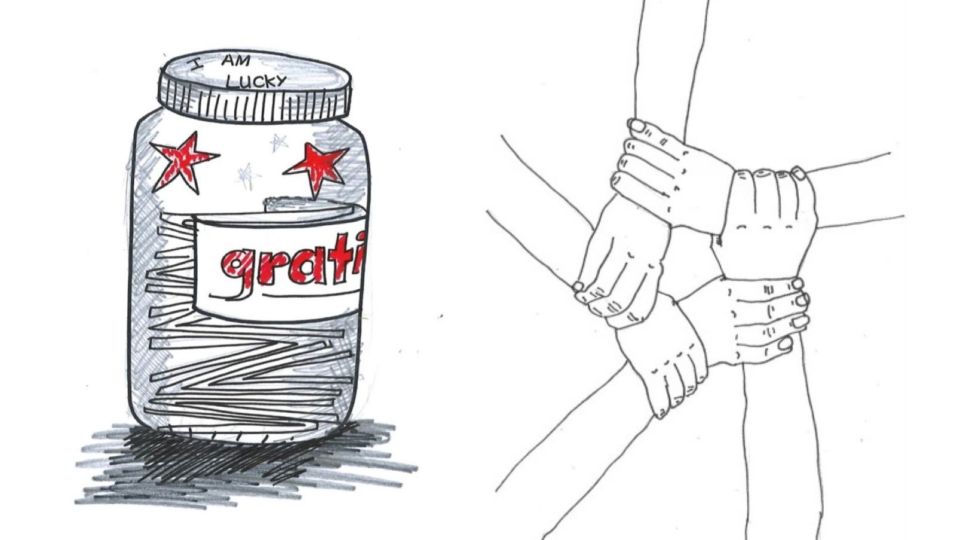With Hong Kong in the midst of its worst wave of COVID-19, uncertainty and isolation are taking a toll on many residents’ mental health.
Just last week, an expert warned that the city is facing a “crisis” level of suicide risk.
With the pandemic not leaving us any time soon, it is important for us to not brush aside the anxious feelings and learn to cope with them.
To do so, psychology and counselling services provider Red Door has come up with the First Aid: Anxiety guide to help people in Hong Kong.
Head counsellor Angela Watkins noted the alarm bells were ringing when she noticed from interactions with clients and monitoring of online discussions that people were not only talking about their anxieties, but also expressing them through anger, fear or disappointment toward confusion about coronavirus strategies, restrictions and testing.
“The confusion and mistrust around government messaging have driven this massive sense of uncertainty, which drives anxiety,” she said.
Watkins said this was especially severe in late February, when the government announced a mandatory universal testing exercise, which has since been shelved.
The announcement prompted her to set up a support group that meets once or twice a week, and share techniques and advice to more people through a first aid guide.
Watkins said the guide is founded on a counselling and psychology approach to coping with anxiety, but is especially tailored for people in Hong Kong in this time of COVID-19.
“We look at how people are responding to things that are happening just in Hong Kong, such as a lack social consent to certain processes and people being fed up,” she said.
Read Red Door’s First Aid: Anxiety guide below.
Step 1: Measure and monitor anxiety
It is important that you gain the ability to monitor your anxiety. It is normal to feel anxious in a time of such uncertainty. Changes in policies and the status of the pandemic interfere with our feelings of being able to control the outcome of this situation. It is normal to experience some anxiety, some frustration and some sadness when life is disrupted. Whilst it is normal, it still requires a healthy response to protect yourself psychologically. Knowing how you are doing is the first step in figuring out how to respond.
Monitoring your anxiety regularly allows you to recognize if your anxiety is becoming more than you can take on a regular basis. Take three moments during the day to rate your anxiety on a scale of zero to 10. A score of zero indicates no anxiety. A score of 10 indicates severe anxiety, with symptoms such as heart palpitations and breathlessness, perhaps requiring hospitalization. A score under five indicates that you still feel that you can function in performing your daily tasks — be it study or work. A score of over five indicates that your anxiety is starting to affect your ability to function.
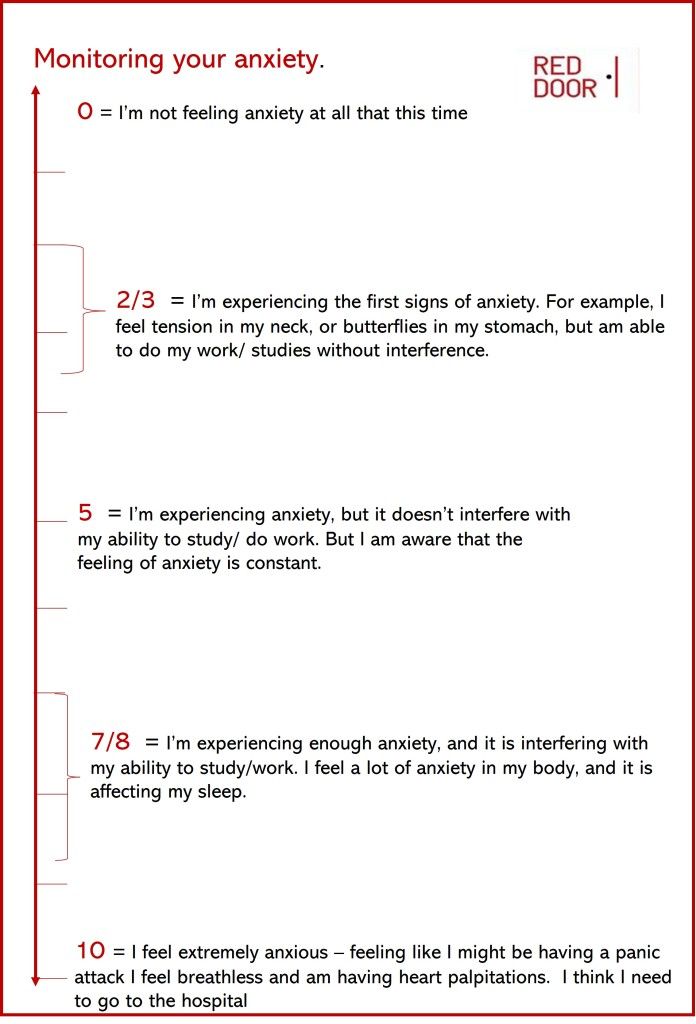
Record your score a few times a day. Make a record of the maximum score you experienced during the day and what you were doing just before or when that maximum score occurred.
Step 2: Employ techniques to provide immediate relief from anxiety
If you are experiencing anxiety at a level of seven to 10, you may like to use some immediate first aid techniques to treat the anxiety in your body. Essentially you want to soothe your body back into a normal automatic breathing pattern. I recommend deep breathing exercises and distraction techniques using the senses, color or physical activity.
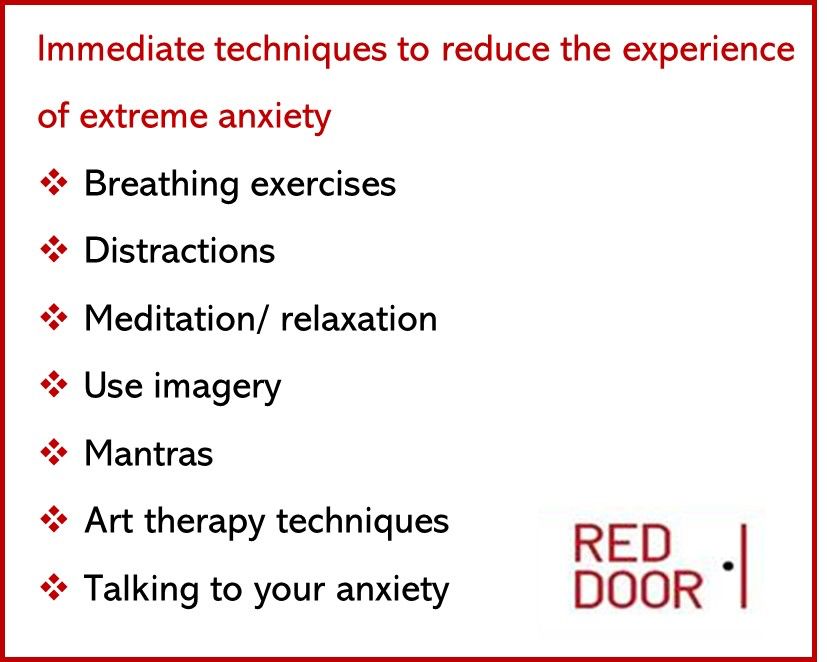
These techniques are sometimes called grounding or self-soothing techniques. They can also be helpful when you are flooded with other strong emotions, including sadness and anger.
Step 3: Build a personalized treatment plan to build better responses and prevent anxiety in the future
Every person’s experience of anxiety is unique, but there are many common elements that we can include, or exclude in a treatment plan for your anxiety. You are in the best position to monitor your anxiety. You can use the following information to decide what elements might be the best for you to include in a treatment plan. Utilizing an external expert, such as a counsellor, will also help you capture information about historical triggers and clarify activities that help you heal from those which may actually harm you in your recovery from anxiety.
3a) Identify amplifiers and reducers of anxiety
By monitoring your anxiety and reviewing your anxiety responses from the past, you can explore some of the activities that amplify your experience of anxiety. Red Door recently set up anxiety workshops in response to anxiety people reported during the current wave. Some of the things that amplify people’s experience of anxiety include excessive scrolling of news, consumption of social media, and even (careless) conversations with friends and colleagues. Watch how you feel after reading the news. Is your anxiety experience rating increasing or decreasing?
Think about your response to stress and anxiety. What do you do when you see that there are increasing cases, or new restrictions. Do you pass on your anxiety to others — post the bad news on the internet? Do you want to help? What is your response? Is your response improving your feeling of anxiety, or making it worse? Being mindful of your anxiety will help you identify what escalates those anxious feelings.
It may be tempting to blame your feelings on the actions of others, for example saying, “My husband makes me anxious.” Own your own feelings. People’s actions are their own. Your feelings are your own. Whilst people’s actions can be careless, sometimes even hurtful, often our perception and interpretation of those behaviors are what hurt, rather than the actions themselves.
Take note of those external triggers that amplify your anxiety and consider to limit them. In our anxiety workshops during the pandemic, actively reducing news and social media consumption has helped our participants better manage their anxiety at this time.
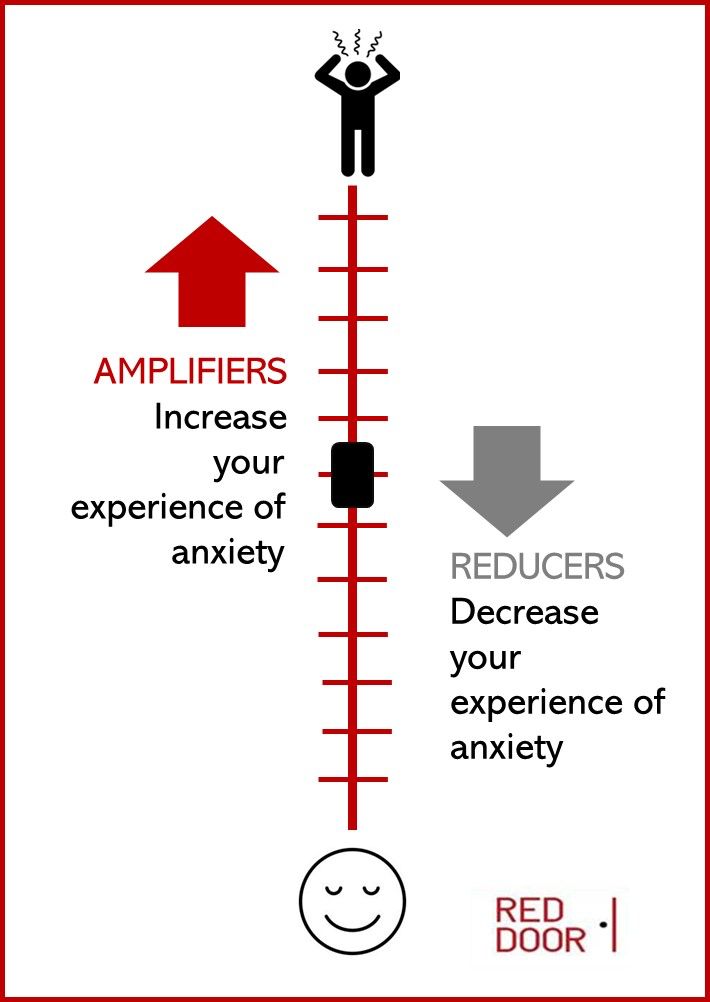
In addition to amplifiers, take a moment to think about those moments in the day that you feel most at peace. We are well trained to note when we feel anxious, but it takes specific focus to capture yourself feeling calm. It is important to understand what people or activities are associated with your sense of calmness or reduction of anxiety. For many people, a moment in the sunshine, or a brief walk, may bring them some sense of calm. For you, it may be when you take hold of a good cup of tea. Make note of these anxiety reducing activities. We need to build them into your self-care treatment plan, which I will detail later in this article.
Many people respond to crises in various ways. We know about the fight or flight response. Some people choose to stand and fight. Others choose to help — look at how they can support the less fortunate. Others choose to cheer others on — inserting humor or other entertainment. All of these responses can exacerbate or decrease your anxiety. Fleeing in response to perceived, rather than real, danger can solidify the anxiety-flee response. Sometimes you need to stand your ground and deal with your anxiety rather than move away. These situations are best discussed with a professional.
Choosing to help is actually a great way to achieve some sense of control at a time of uncertainty. Helping others and volunteering are great for building gratitude, which is one aspect of a healthy anxiety management plan.
3b) Build a checklist
In the longer term, having a list of activities that help and harm you will help you build better protection and prevent anxiety in the future.
Take the amplifiers that you identified from the exercise above and the activities that reduce your anxiety. Put them into a checklist under the items that help and harm your anxiety. You want to build a checklist of activities that help you and harm you so that you know what you need to do on a daily or weekly basis.
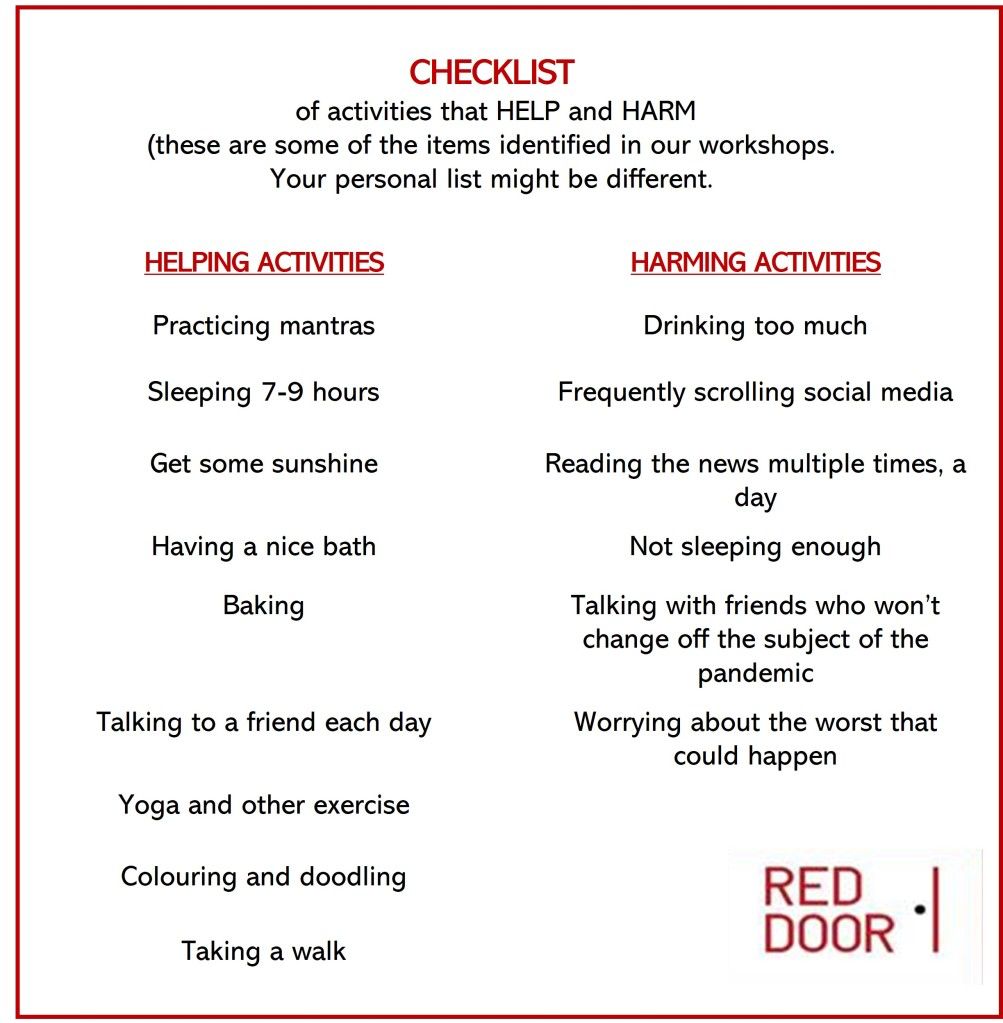
The activities that are detailed above can be added, if you believe they might help you. Once you have a list of helping activities, I want you to commit to trying each one once a day or once a week, whichever frequency seems more sensible.
For those behaviors you consider potentially harmful, I recommend that you place a limit on them. For example, you can set limits on social media scrolling and manage the number of times you check the news a day.
There is a set of behaviors that may seem like helping behaviors, but may, when done in excess, become a harm. For example, you may want to monitor your consumption of alcohol, recreational drugs and any form of self-medication. People sometimes think that these activities help them cope with anxiety, but actually when observed, you may notice that that they are actually maintaining anxiety over time, not dissipating it.
You can build a number of items into your checklist. Have a look at our sample, read through the rest of this document and decide what items you want to utilize to help you, and those items you want to start monitoring and limiting that harm you.
3c) Check your perspective
Accepting your circumstances is, in part, a matter of perspective. Those who are content are more likely to be able to respond positively to changes when it is required, accept that some events are beyond their control and allow situations to be different from their expectations. This is because they can approach challenges with a perspective that is mindful of the extra thoughts that they may have within a situation, or in response to a stimulus, to check what is real from their interpretation of events.
Famous psychologist Albert Ellis identified a plethora of irrational beliefs that we develop as part of the way we are raised, see the world, and believe ourselves and other people. These beliefs are filters that, like a pair of glasses, interfere with the way that we see situations. Wearing faulty filters may cause people to engage in self-defeating behaviors such as experiencing self-hatred, jealousy, self-harm, accepting abusive relationships, procrastinating and anger.
The good news is that it is possible to change your thinking and be happier.
You can help yourself and remove some ineffective thinking filters by creating a constructive dispute with yourself. Experiencing faulty filters is quite common. If you discover you have been experiencing faulty filters, you can change the view. By disabling these filters, you will start responding to what is, not simply your processed interpretation.
It is important, however, to pay attention to three filters that cause particular concern during this time — catastrophizing, comparing and mind reading/blaming.
Catastrophizing
Catastrophizing refers to the faulty thinking filter that we apply when exploring the future of situations in regard to negative outcomes. This is very common during a pandemic because we don’t know what the outcome will be.
Whilst it is typical to occasionally feel a negative outcome, when we go for medical checks and such, excessive worry is of no help. During the pandemic, you don’t need to look much further than social media to see evidence of catastrophic thoughts.
If you tend to catastrophize regularly, you cause yourself immense distress. Imagining that all situations will end in disaster is exhausting. Worrying that people will die or leave you will not make those situations any easier when they do happen, it just makes you experience the situation virtually again and again.
People who catastrophize need to challenge their thinking with more realistic thoughts and remind themselves how many times in the past situations have turned out OK. Often, the worry caused by catastrophizing may move people to seek out reassurance from others and this in itself can become a problem. Try to do nothing for a while first. Whilst the anxiety you feel is unpleasant, you can work to distract yourself from that experience with anxiety relieving activities.
One specific cure to reset your catastrophic thinking is to engage the perspective taking exercise of “at least”. Some individuals can become hardwired with a pessimism bias. The pessimism bias refers to the tendency to overestimate the likelihood of negative events, while underestimating the likelihood of positive events. This attitude of expecting the worst is a prominently associated with the experience of depression and anxiety, and can have considerable ramifications for recovery from these conditions.
If you find you naturally comment on the negative aspects of a situation, consider changing your choice of expressions, if only for a little while. We sometimes forget that when we speak, we are feeding ourselves. This negativity loop can be hard to break. In therapy, one way we start to break the process is to encourage clients to start to use the phrase “at least” when they speak, either attached to their pessimistic dialogue or to help build some sense of gratitude.
This approach may seem like chasing rainbows rather than dealing with the real issues. I would challenge you to consider if your negative viewpoints are honest, comprehensive and useful. Almost every challenge has both difficult and beneficial elements. For example, I work with teens and when it became obvious that school will be online for a protracted period of time, I asked them what they liked about online school. They came up with the following things they liked. I did not ask them if they like online school more than in-person school. I cannot provide them with in-person school when it is not possible. Rather, I am helping them see the positive aspects of a situation that can feel beyond their control.
Over the longer term, practicing gratitude will help develop a more positive mindset, which will help us be more practiced in seeking the pleasing elements of your life, leading to a greater sense of satisfaction in general.
Practicing gratitude is associated with a stronger immune system, as well as more positive emotions and happiness. It’s easy to be grateful over the big things, such as a bonus, the birth of a child and a promotion. The real benefit is for individuals in practicing gratitude over the smaller things — a sunny day, a successful cake, a kind gesture from a friend and technology that works without trouble. That is where the magic happens.
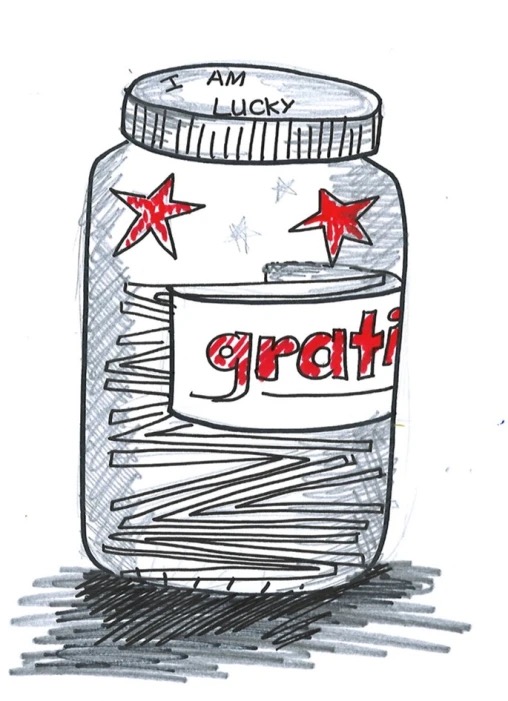
Practicing gratitude regularly, either through journaling or keeping a gratitude jar, helps to develop the habit of gratitude. When we practice gratitude regularly, we start to mentally contrast negative news stories and voices around us, looking for the positive element rather than amplifying the negative.
I particularly like the gratitude jar exercise because both adults and children can use it. Take a jar and label it your gratitude jar. If you have children, you may like to decorate this jar with stickers and plastic gemstones. Once the jar is “complete”, you can start to fill it. Using post-its or note papers, write one or two things that you are grateful for.
The combination of mind reading and blaming
Mind reading occurs when we make assumptions about people in the absence of all the evidence, because we are convinced, that at some level, we know what they are thinking. Whilst on some occasions we may guess this right, we may also get this wrong. For example, I often talk with clients who assume work colleagues talk about them negatively or think in a particular way about them. In my experience, we tend to overestimate how much people talk about us and how judgmental of us they may be. Most people are usually worrying about their own performance, and what they need to do, rather than the role we play.
Occasionally people let us down, even hurt us with their actions. Sometimes these actions are intentional. Many times, they are not. It is good to be able to accept disappointment and the imperfections of others. If you find that you become stuck in the process of blaming others for your position in life, you give away some of the power to fix that situation. Accepting someone’s behavior is not an endorsement of that behavior, it is simply acknowledging that bad realities exist, and that life can be unfair.
During a pandemic, people can combine both these mind reading and blaming filters, especially regarding the decisions of governments or health authorities. A pandemic such as COVID-19 had not been experienced during most experts’ lifetime, even if they studied previous case studies. So, governments and health authorities can make decisions that, sometimes, look like mistakes. We make ourselves additionally anxious when we assume that they are making those decisions because they don’t care about the outcome for us as individuals, or that they want us to suffer. I don’t agree with many governments’ approaches to managing the pandemic, but I find it helpful to remember an adaption of Hanlon’s Razor: “Never attribute to malice that which is adequately explained by incompetence.”
When society is responding to a pandemic, there will be setbacks. Overcoming mistakes or setbacks is a part of life and allows us to build resilience. Ask yourself, what actions by the government, or your company, or building management are really aimed to cause you harm? Are these people intentionally trying to hurt you, or is it possible they are doing the best with the information that they have, and the fears that they hold? We don’t have to give in to policies that we find unacceptable, but it will help your experience of anxiety to better try to understand that those making decisions are not personally trying to upset you.
The final filter to eliminate — comparison
It is common to consider our own attractiveness, status, success and personal worth relative to others. During a pandemic, regularly comparing yourself and your circumstances to those of others can increase your anxiety. Feeling jealous because friends left Hong Kong to live temporarily overseas will not help your need to stay here. It increases your sense of worry — there must be a reason that people needed to flee. Ask yourself if that is really accurate.
Comparison is a guaranteed path to misery.
When you compare, you tend to look at the world through a lens of winners and losers. You will always find others who have achieved more than you. This is disorienting and artificially casts you in the role of loser.
Additionally, comparisons are often driven by inaccurate information. We often compare snapshots, and these are often superficial and incomplete. For example, you might feel jealous of people sitting by the pool in Singapore whilst you have to work from home. That is nice for them. They have a pool. They can have dinner at a restaurant. You can’t, right now. That doesn’t mean things will always be that way. This doesn’t mean that everything is going well, or will go well for those people.
Comparing yourself with others will only echo the feeling that life is unfair. Some people are born with more advantages such as social connections, wealth and looks. The world is an uneven playing field. When we focus on comparisons, we brood on this unfairness rather than focus on what we have the power to achieve.
3d) Add calming activities to your daily diet
Specific activities that help to calm the body can help, not only in times of a crisis, but also to build a regular routine of self-soothing and calming.
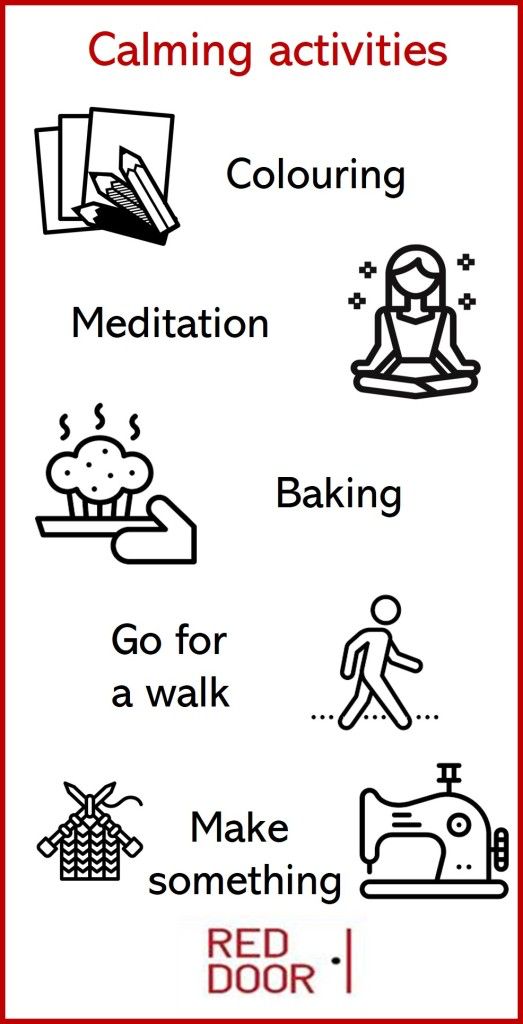
These activities help introduce a sense of calm in your life:
Meditation
Meditation is a good way to bring about a sense of peace and help you better manage stress. These benefits do not end when the meditation exercise ends, they can be carried into the rest of your day and employed at times when you encounter something that makes you feel anxious.
Meditation is an umbrella term for the many ways to a relaxed state of being. There are many types of meditation. Committing to even a few minutes of meditation a day can help. Anyone can practice and benefit from meditation.
During meditation, you focus your attention, and eliminate the stream of thoughts that may be crowding your mind and creating a state of stress.
Some of the types of meditation you might like to try include:
Guided meditation. Sometimes called guided imagery or visualization. With this method of meditation, you form mental images of places or situations you find relaxing. These meditations often ask you to engage your senses and therefore act as good distraction to calm your breath and stop trails of intrusive thoughts. You can find guided meditations on YouTube or Spotify.
Breathing focused meditations. This type of meditation is based on being mindful, or having an increased awareness and acceptance of living in the present moment, all whilst focusing on your breathing patterns.
Mantra focused meditations. In this type of meditation, you silently repeat a calming word, thought or phrase to prevent distracting thoughts and to create a sense of calm.
Coloring books
Coloring activities create a sense of calm. Coloring books are extremely popular as a result of the positive effect possible from regular coloring. Coloring is not just for children. Teen and adults benefit from coloring activities as well. Doodling is also a great way to create a sense of calm if you would rather create your own artwork.
Other calming activities
Going for a walk, especially in nature, is one way to bring calm into your day. Some people find making art projects — sewing, knitting and woodwork — a great way to achieve calm. During the pandemic, many people have taken to baking as a relaxation technique. You can experiment to find out what works for you.
3e) Have healthy habits
Practicing healthy habits, especially getting enough sleep, will help you better manage your anxiety. It doesn’t take more than a few nights of poor sleep for frayed tempers and foggy minds to impact your ability to cope with challenging circumstances.
Adults require seven to nine hours of sleep a night. Teens and children require more. Sleep is required to recover from the day, including processing the psychological toll that living in pandemic conditions creates. If you have trouble getting to sleep, or staying asleep, try employing many common sleep enhancing activities such as creating a calm bedtime routine, having a shower and a bath, and banning technology an hour before bedtime and from the bedroom. You can consider medication such as melatonin, if your doctor agrees.
In addition to sleep, other habits such as a good diet and exercise can help better manage your experience of anxiety. The opposite is also true — being overweight and possibly hypertensive, consuming too much alcohol and sugar, smoking, and medication can actually increase your experience of anxiety and anxiety symptomology.
A special point I’d like to offer is to please watch your consumption on alcohol in response to anxiety. Many jokes are made about “wine o’clock” as a stress response. If you find that you cannot limit your consumption to one drink a day, then start to reflect on your relationship with alcohol. Many people find that they need to consider if their alcohol consumption is helping or harming them. There is no shame in taking a break if you need it.
3f) Utilize your social supports
Friends are important. In times of crisis, good friends are critical. Unfortunately, responses to the pandemic often break down social support systems and individuals can feel isolated. You may need to actively build new support mechanisms and networks to ensure that you have good people to talk to during periods of stress.
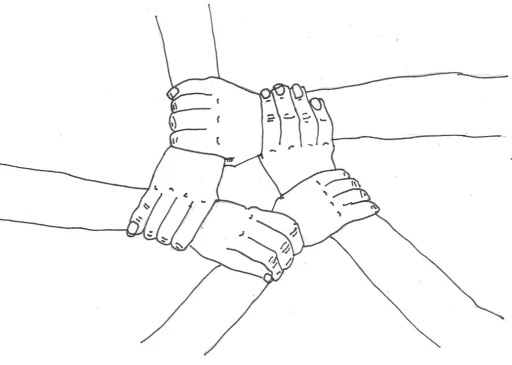
It is important to talk to people who actively help you reduce your experience of anxiety. They may simply be the people who listen to you and say that times are tough right now. If you follow the guidelines of monitoring your anxiety regularly, you may like to record how you feel after interactions with various friends. Talking to some friends may may you feel better, and others the opposite.
Some people seem determined to offload their anxiety onto others. If you have friends like this, perhaps ask if you can change the topic of conversation as it makes you uncomfortable. A good friend will heed such a request. If a friend cannot “change the channel”, you may choose to spend less time with that person.
Times of crisis are, often and unfortunately, a time when we learn how strong and helpful our bonds with other people really can be. During the pandemic, some of your friends may let you down. If this happens, you will probably feel abandoned and upset. People can disappoint us sometimes. I also suspect, that if you look around you, you will notice that other friends have been more supportive and helpful than you originally anticipated. These revelations can be unsettling. Forgive yourself for expecting more of some friends than they can provide, but also be thankful for those people who show up and offer support.
3g) Practice mindful communications
Winston Churchill once commented, “We are masters of the unsaid words, but slaves to those we let slip out.” He was referring to sharing secrets, but this saying can also apply to how we communicate with others during a time of heightened stress.
This is particularly applicable to our communications on social media. Whilst we may have read an article that alerts us to a perceived risk, think if you really want to share it with others online. Ask yourself — is this communication helpful? Is it accurate? Is it factual rather than sensational in its content? Is it necessary for people to know this information? Is it kind for me to share this information? If you answer is no to those questions, consider holding off on sharing that information online.
You may often feel overwhelmed and anxious, and it is appropriate to talk to someone about those feelings. Friends who you know well will be a good first point of call. Consider the recipient if you post about your anxiety online, and if you do, own your feelings. For example, write “I feel worried how my kids will be affected by interruptions in their schooling” rather than “Kids have been completely ruined by online school”. The later style of statement may cross the line between simple venting and trauma dumping. When in doubt, keep the shares on your personal life within your private circle of friends.
3h) Pack away your baggage
At times when you are under great stress, you want to reserve the energy that you have and will need to fight the battle you need to fight. In a pandemic, it is the worry about infection and treatment options in an environment of miscommunication. You need to utilize your energy to keep yourself as balanced and focused as you can be.
In order to do this, you can call a halt to any other fights that are ongoing in your life, with your in-laws or other family members, or with your neighbor or child’s school. Those fights can wait.
Unresolved trauma from the past has a way of becoming unpacked when we are presented with a new threat. For example seeing the government struggle to cope with the current wave of infections and severely sick people may remind you of your own feelings of abandonment. It may be time to put the weight of those traumas behind you with some professional help.
3i) Ask for help if you need it
If your anxiety is crippling, persistent, or requires you to perform organized routines or practices, please consider seeking additional support. You may be advised to visit a counsellor, a psychologist or a psychiatrist in order to help build a different treatment plan. Medication for anxiety is nothing to be ashamed of. We are living through a time of great uncertainty and if your doctor recommends a little extra help, perhaps consider taking it.
Putting it all together
You now know the elements of a treatment plan and you can put it together for yourself to frame a checklist of practices that should help you during times of heightened anxiety. For some of these activities, it may help to join a class to create a dedicated time to perform such activities. I recommend online art therapy and yoga classes for this time.
Even if you want to put everything into practice, you may feel trapped trying to navigate your negative thought patterns or overcome pain from the past. That is when a professional counsellor or psychologist might help. There is no shame in visiting a counsellor.
The scientific benefits of counselling are extensive, and include:
- Improved well-being and health
- Improving your relationships (friendships, professional relationships, romantic relationships and relationships with family members)
- Decreased feelings of depression and anxiety
- Help you get through tough times (pandemic, illness, breakups and disappointments)
- Accept yourself and improve your self-esteem
- Build resilience
- Overcome past challenges and hurts
- Help remove roadblocks in your life, which make you feel stuck
- Feel supported and feel seen
- Better express yourself
- Improve your ability to manage your emotions
- Help you feel more hopeful
- Improve your motivation
- Better understand yourself and discover more about yourself
- Find your purpose in life
Red Door offers free online pandemic focused anxiety workshops on Thursday evenings. You can register by emailing Angela Watkins at angelaw@reddoor.hk.
